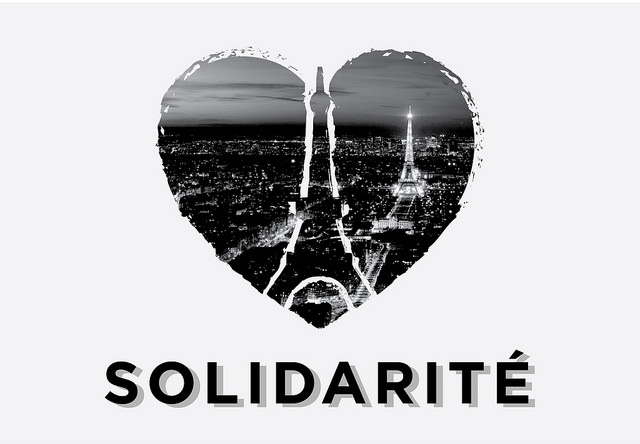 The deadly attacks in Paris last Friday have generated sincere expressions of shock, solidarity, mourning, and anger from around the world, yet that response also generated critical hashtags such as #selectivemourning. As many have discussed in social media and articles, bombings in Beirut the previous evening received only limited coverage in the US media and few mentions on social media. We can blame the media, but that is a little simplistic, as the media not only directs our interests but also reflects them. If sufficient numbers in the audience clamored for more information about the attacks in Beirut or previous attacks on civilians over the past twelve months in Nigeria, Kenya, Yemen, Afghanistan, and Pakistan, perpetrated by a range of forces, then the media coverage would increase. In fact, most who have pointed out the imbalance in the coverage are only doing so in the light of the Paris attacks. Few changed their Facebook profile photos for solidarity with Lebanon, despite it appearing in the news. Continue reading “It’s All About Us”
The deadly attacks in Paris last Friday have generated sincere expressions of shock, solidarity, mourning, and anger from around the world, yet that response also generated critical hashtags such as #selectivemourning. As many have discussed in social media and articles, bombings in Beirut the previous evening received only limited coverage in the US media and few mentions on social media. We can blame the media, but that is a little simplistic, as the media not only directs our interests but also reflects them. If sufficient numbers in the audience clamored for more information about the attacks in Beirut or previous attacks on civilians over the past twelve months in Nigeria, Kenya, Yemen, Afghanistan, and Pakistan, perpetrated by a range of forces, then the media coverage would increase. In fact, most who have pointed out the imbalance in the coverage are only doing so in the light of the Paris attacks. Few changed their Facebook profile photos for solidarity with Lebanon, despite it appearing in the news. Continue reading “It’s All About Us”
What Should You Be on Halloween?
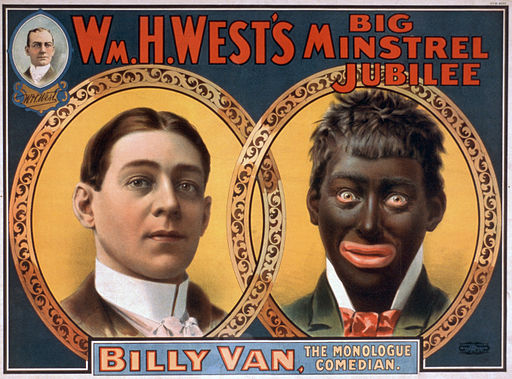 A culture is not a costume. That sentiment has become a common theme on social media and student newspapers (here from James Madison University and here from Chapman University, for example) with the approach of Halloween. The sentiment makes sense with people, primarily identified with a majority community, masquerading for fun as a stereotyped member of a minority. The history of using minority images for entertainment and benefit of majorities is long and painful, including the blackface minstrel shows of a century ago. Such costumes reinforce the costumed person’s majority status as he/she masquerades as something other, thus demonstrating differences in power.
A culture is not a costume. That sentiment has become a common theme on social media and student newspapers (here from James Madison University and here from Chapman University, for example) with the approach of Halloween. The sentiment makes sense with people, primarily identified with a majority community, masquerading for fun as a stereotyped member of a minority. The history of using minority images for entertainment and benefit of majorities is long and painful, including the blackface minstrel shows of a century ago. Such costumes reinforce the costumed person’s majority status as he/she masquerades as something other, thus demonstrating differences in power.
However, accusations of cultural appropriation also can become assertions of power and control from some in minority groups. In the video embedded below, the narrator describes cultural appropriation as “when you hijack a part of a culture without permission, not out of respect or tribute.” Continue reading “What Should You Be on Halloween?”
Is Your Group Oppressed?
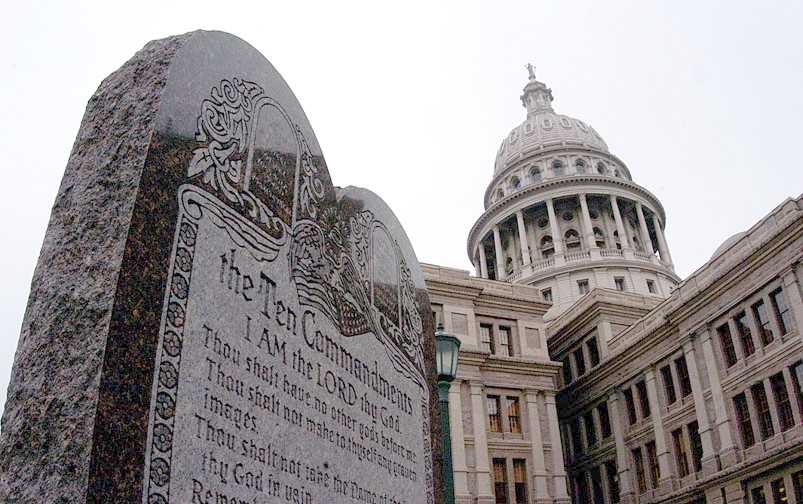 “A war against Christianity,” a friend on Facebook asserted, as he pointed to examples in the United States and around the world. The shooting at Umpqua Community College recently and the various occasions when ISIS has executed people identified as Christians provided prime examples. Others making similar claims point to shifts in US policy, including the removal of the Ten Commandments from schools and courthouses, restrictions on official prayer at public schools, and movements to remove “God” from the Pledge and US money. Continue reading “Is Your Group Oppressed?”
“A war against Christianity,” a friend on Facebook asserted, as he pointed to examples in the United States and around the world. The shooting at Umpqua Community College recently and the various occasions when ISIS has executed people identified as Christians provided prime examples. Others making similar claims point to shifts in US policy, including the removal of the Ten Commandments from schools and courthouses, restrictions on official prayer at public schools, and movements to remove “God” from the Pledge and US money. Continue reading “Is Your Group Oppressed?”
Love, Community, and Cow Urine
 Constructing and maintaining a group, a community, requires significant effort, and at times that effort generates disagreements. In India, an organization announced this week that they were restricting admission to Garba, a traditional dance that is a major component of Navratri, a nine-night festival honoring the goddess. Only people recognized as Hindus can participate, banning specifically those identified as Muslim. A local leader of the VHP, an organization associated with Hindu nationalism, asserted, “Incidents of love jihad where Muslim boys lure and marry our Hindu girls happen at Garba. Our only aim is to protect our girls.” Continue reading “Love, Community, and Cow Urine”
Constructing and maintaining a group, a community, requires significant effort, and at times that effort generates disagreements. In India, an organization announced this week that they were restricting admission to Garba, a traditional dance that is a major component of Navratri, a nine-night festival honoring the goddess. Only people recognized as Hindus can participate, banning specifically those identified as Muslim. A local leader of the VHP, an organization associated with Hindu nationalism, asserted, “Incidents of love jihad where Muslim boys lure and marry our Hindu girls happen at Garba. Our only aim is to protect our girls.” Continue reading “Love, Community, and Cow Urine”
Who Supports Al-Qaeda and ISIS?
 Let’s start with Ben Carson, Republican candidate for President of the United States. After his statements on Sunday saying that he would not support a Muslim as President of the United States and that Islam, as a religion, is incompatible with the US Constitution, his further explanations have compounded the problem. According to a Politico article, Carson reportedly clarified that someone with a Muslim heritage could win his support if that person is “willing to reject the tenets [of Islam] and accept the way of life that we have and clearly will swear to place the Constitution above their religion.” In case his meaning is not perfectly clear, he continued, “Then, of course, they will be considered infidels and heretics.” His campaign manager similarly clarified that there was no problem with someone who followed “Islam-lite.” Continue reading “Who Supports Al-Qaeda and ISIS?”
Let’s start with Ben Carson, Republican candidate for President of the United States. After his statements on Sunday saying that he would not support a Muslim as President of the United States and that Islam, as a religion, is incompatible with the US Constitution, his further explanations have compounded the problem. According to a Politico article, Carson reportedly clarified that someone with a Muslim heritage could win his support if that person is “willing to reject the tenets [of Islam] and accept the way of life that we have and clearly will swear to place the Constitution above their religion.” In case his meaning is not perfectly clear, he continued, “Then, of course, they will be considered infidels and heretics.” His campaign manager similarly clarified that there was no problem with someone who followed “Islam-lite.” Continue reading “Who Supports Al-Qaeda and ISIS?”
Better Safe Than Sorry
 The old adage that many parents have taught their children has taken on more powerful form in the age of Terror Alerts and school shootings. Like those airport announcements about reporting any unattended baggage, these admonitions and attitudes generate fear that justifies increasing governmental surveillance and the appropriation of additional resources to the state’s security apparatuses (and the private companies who make surveillance equipment like the $120 million of full body scanners whose effectiveness is questionable). The troubling consequences from this creation of terror and fear extend further. Continue reading “Better Safe Than Sorry”
The old adage that many parents have taught their children has taken on more powerful form in the age of Terror Alerts and school shootings. Like those airport announcements about reporting any unattended baggage, these admonitions and attitudes generate fear that justifies increasing governmental surveillance and the appropriation of additional resources to the state’s security apparatuses (and the private companies who make surveillance equipment like the $120 million of full body scanners whose effectiveness is questionable). The troubling consequences from this creation of terror and fear extend further. Continue reading “Better Safe Than Sorry”
Good vs. Evil Makes a Good Story
 Darth Vader vs. Luke Skywalker, Sauron vs. Gandalf, Voldemort vs. Harry Potter. Stories are full of good and bad characters, sometimes complicated with the redemption of a character like Darth Vader, but what does it take to maintain such a stark division between good and evil?
Darth Vader vs. Luke Skywalker, Sauron vs. Gandalf, Voldemort vs. Harry Potter. Stories are full of good and bad characters, sometimes complicated with the redemption of a character like Darth Vader, but what does it take to maintain such a stark division between good and evil?
When the Census Creates Fear
 Are Muslims taking over India? Recently released data from the 2011 Census of India generated various headlines, from the alarmist assertion that the percentage of the population identifying as Hindu has declined to the calmer emphasis on the slowing growth in communities identified as Muslim. One Hindu nationalist organization provocatively asked in response to the data, “Is there a larger conspiracy to Islamise Bharat [India]?” These reactions to demographic shifts look familiar, like responses to demographic change in the US concerning religious affiliation or ethnic identity. Analyzing the dynamics underneath the numbers reveals that these instruments are not simply describing changes in our world but constructing our world in particular ways. Continue reading “When the Census Creates Fear”
Are Muslims taking over India? Recently released data from the 2011 Census of India generated various headlines, from the alarmist assertion that the percentage of the population identifying as Hindu has declined to the calmer emphasis on the slowing growth in communities identified as Muslim. One Hindu nationalist organization provocatively asked in response to the data, “Is there a larger conspiracy to Islamise Bharat [India]?” These reactions to demographic shifts look familiar, like responses to demographic change in the US concerning religious affiliation or ethnic identity. Analyzing the dynamics underneath the numbers reveals that these instruments are not simply describing changes in our world but constructing our world in particular ways. Continue reading “When the Census Creates Fear”
Ironic Symmetry
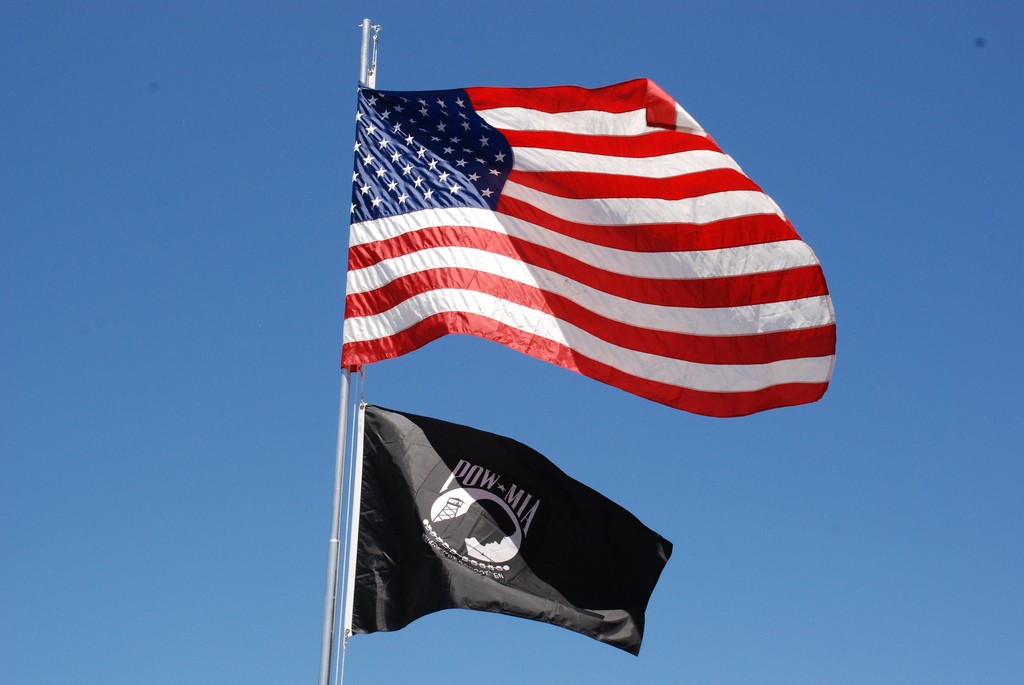 People tend to use historical narratives to construct the essence of a movement or symbol, but only when it is convenient. Case in point, a recent Washington Spectator article argues that the POW/MIA flag should be taken down because it was a cynical tool that the Nixon administration created to galvanize support for the Vietnam War. Soldiers who had previously been classified as “Killed in Action/Body Unrecovered” were suddenly identified as “Missing in Action” or potentially POWs whose life or remains must be recovered before leaving Vietnam. These efforts included exaggerating the numbers of soldiers as POWs or Missing in Action in the Vietnam War to justify, in part, continuing the war. Because of this narrative of the flag, the author asserts that it should be removed because of its negative origins in manipulative lies and violence, comparing it to the Confederate flag and its historical meaning. Continue reading “Ironic Symmetry”
People tend to use historical narratives to construct the essence of a movement or symbol, but only when it is convenient. Case in point, a recent Washington Spectator article argues that the POW/MIA flag should be taken down because it was a cynical tool that the Nixon administration created to galvanize support for the Vietnam War. Soldiers who had previously been classified as “Killed in Action/Body Unrecovered” were suddenly identified as “Missing in Action” or potentially POWs whose life or remains must be recovered before leaving Vietnam. These efforts included exaggerating the numbers of soldiers as POWs or Missing in Action in the Vietnam War to justify, in part, continuing the war. Because of this narrative of the flag, the author asserts that it should be removed because of its negative origins in manipulative lies and violence, comparing it to the Confederate flag and its historical meaning. Continue reading “Ironic Symmetry”
Response to the American Academy of Religion’s Statement on Academic Freedom, Part 1
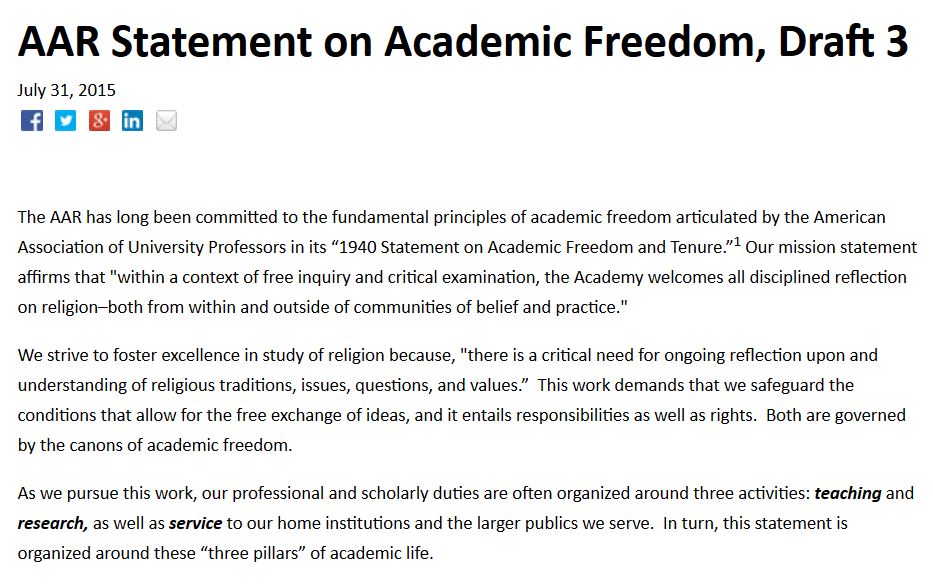
Recently, the Board of Directors of the American Academy of Religion released a draft update to its 2006 statement on Academic Freedom and the Teaching of Religion and solicited feedback from members. Given that the members of Culture on the Edge are all scholars of religion, some have opted to offer their feedback to the AAR via this short series of posts on our site. (An index to all the posts in this series can be found here)
Steven Ramey
The revision of the AAR Statement on Academic Freedom inserts attitudinal terms, such as humility, patience, and generosity, into the revised document (compared to the 2006 version) and thus distracts from the case for academic freedom. While those attitudes are often useful in engaging students and colleagues, they are more appropriate for discussions of best practices than a delineation of academic freedom. The malleability of such terms (with no standard to judge them against except the standards of whomever wants to employ them) creates a problem similar to the language of “collegiality” that the revised statement itself critiques in the final section on service, noting the AAUP’s rejection of that ill-defined rationale for denial of tenure. Continue reading “Response to the American Academy of Religion’s Statement on Academic Freedom, Part 1”
